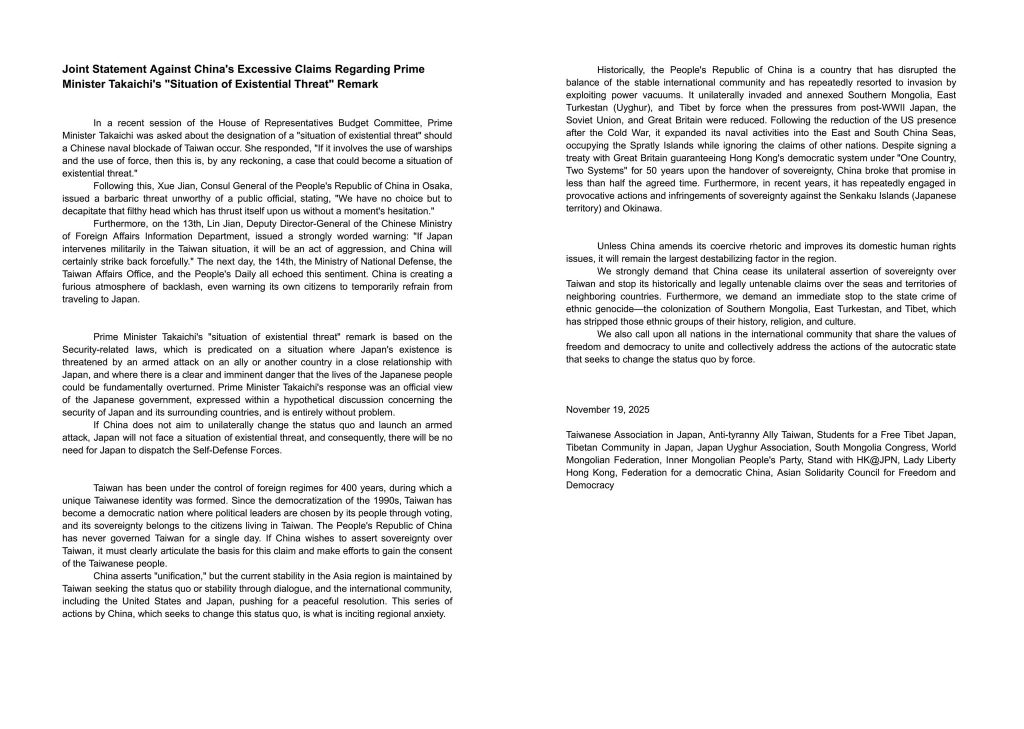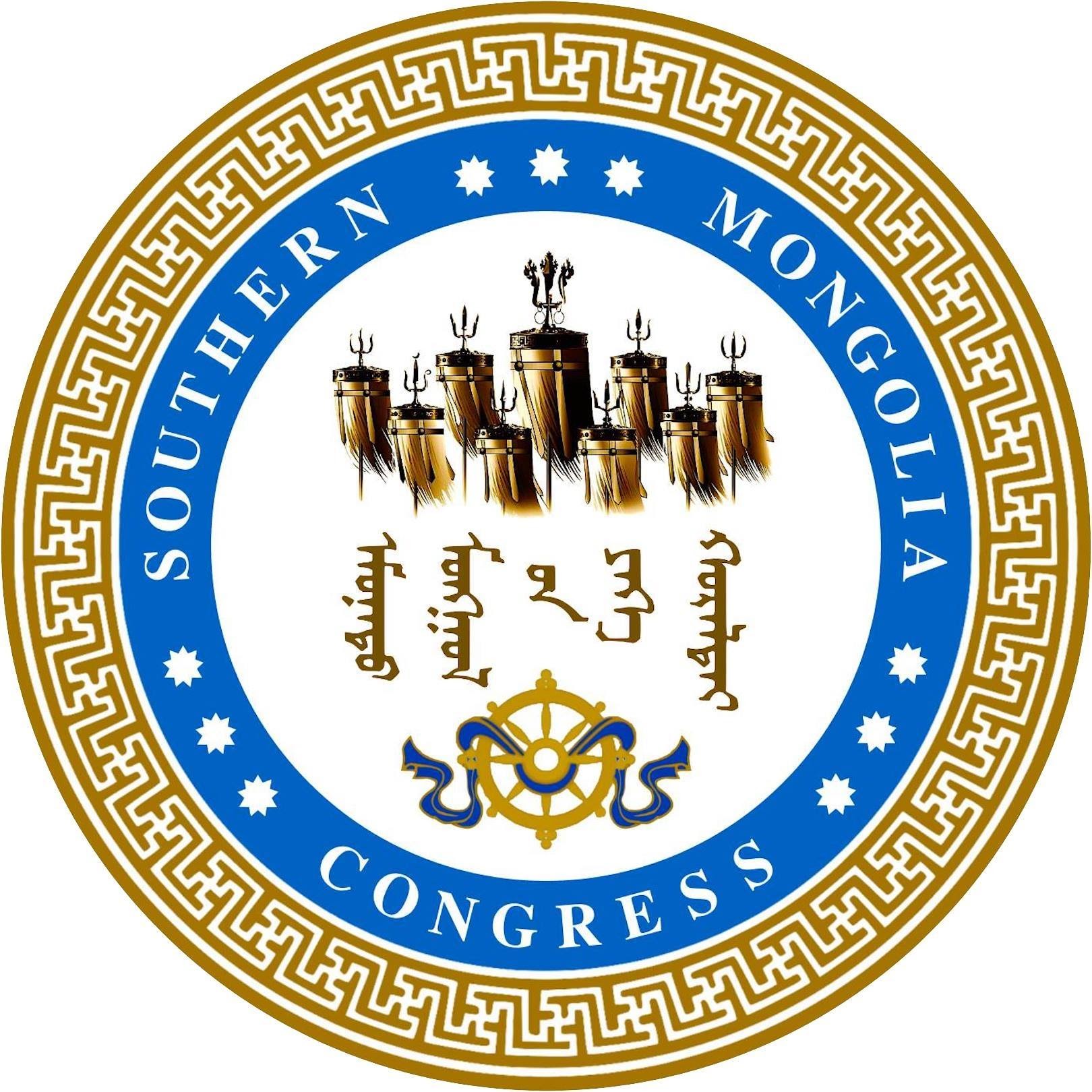
Tensions are growing in the Taiwan Strait, where China continues to exert strong verbal pressure on Japan. This situation is not only about Taiwan — it is a serious issue that threatens peace and freedom in Japan and throughout the entire Asia-Pacific region.
In response, organizations advocating for freedom and human rights — including groups from Taiwan, Southern Mongolia, Uyghur, Tibet, Hong Kong, and the Chinese pro-democracy movement — have come together to issue a joint statement protesting China’s coercive attitude. Now more than ever, we raise our voices to protect the future of Asia.
Joint Statement Against China’s Excessive Claims Regarding Prime Minister Takaichi’s “Situation of Existential Threat” Remark
In a recent session of the House of Representatives Budget Committee, Prime Minister Takaichi was asked about the designation of a “situation of existential threat” should a Chinese naval blockade of Taiwan occur. She responded, “If it involves the use of warships and the use of force, then this is, by any reckoning, a case that could become a situation of existential threat.”
Following this, Xue Jian, Consul General of the People’s Republic of China in Osaka, issued a barbaric threat unworthy of a public official, stating, “We have no choice but to decapitate that filthy head which has thrust itself upon us without a moment’s hesitation.”
Furthermore, on the 13th, Lin Jian, Deputy Director-General of the Chinese Ministry of Foreign Affairs Information Department, issued a strongly worded warning: “If Japan intervenes militarily in the Taiwan situation, it will be an act of aggression, and China will certainly strike back forcefully.” The next day, the 14th, the Ministry of National Defense, the Taiwan Affairs Office, and the People’s Daily all echoed this sentiment. China is creating a furious atmosphere of backlash, even warning its own citizens to temporarily refrain from traveling to Japan.
Prime Minister Takaichi’s “situation of existential threat” remark is based on the Security-related laws, which is predicated on a situation where Japan’s existence is threatened by an armed attack on an ally or another country in a close relationship with Japan, and where there is a clear and imminent danger that the lives of the Japanese people could be fundamentally overturned. Prime Minister Takaichi’s response was an official view of the Japanese government, expressed within a hypothetical discussion concerning the security of Japan and its surrounding countries, and is entirely without problem.
If China does not aim to unilaterally change the status quo and launch an armed attack, Japan will not face a situation of existential threat, and consequently, there will be no need for Japan to dispatch the Self-Defense Forces.
Taiwan has been under the control of foreign regimes for 400 years, during which a unique Taiwanese identity was formed. Since the democratization of the 1990s, Taiwan has become a democratic nation where political leaders are chosen by its people through voting, and its sovereignty belongs to the citizens living in Taiwan. The People’s Republic of China has never governed Taiwan for a single day. If China wishes to assert sovereignty over Taiwan, it must clearly articulate the basis for this claim and make efforts to gain the consent of the Taiwanese people.
China asserts “unification,” but the current stability in the Asia region is maintained by Taiwan seeking the status quo or stability through dialogue, and the international community, including the United States and Japan, pushing for a peaceful resolution. This series of actions by China, which seeks to change this status quo, is what is inciting regional anxiety.
Historically, the People’s Republic of China is a country that has disrupted the balance of the stable international community and has repeatedly resorted to invasion by exploiting power vacuums. It unilaterally invaded and annexed Southern Mongolia, East Turkestan (Uyghur), and Tibet by force when the pressures from post-WWII Japan, the Soviet Union, and Great Britain were reduced. Following the reduction of the US presence after the Cold War, it expanded its naval activities into the East and South China Seas, occupying the Spratly Islands while ignoring the claims of other nations. Despite signing a treaty with Great Britain guaranteeing Hong Kong’s democratic system under “One Country, Two Systems” for 50 years upon the handover of sovereignty, China broke that promise in less than half the agreed time. Furthermore, in recent years, it has repeatedly engaged in provocative actions and infringements of sovereignty against the Senkaku Islands (Japanese territory) and Okinawa.
Unless China amends its coercive rhetoric and improves its domestic human rights issues, it will remain the largest destabilizing factor in the region.
We strongly demand that China cease its unilateral assertion of sovereignty over Taiwan and stop its historically and legally untenable claims over the seas and territories of neighboring countries. Furthermore, we demand an immediate stop to the state crime of ethnic genocide—the colonization of Southern Mongolia, East Turkestan, and Tibet, which has stripped those ethnic groups of their history, religion, and culture.
We also call upon all nations in the international community that share the values of freedom and democracy to unite and collectively address the actions of the autocratic state that seeks to change the status quo by force.
November 19, 2025
Taiwanese Association in Japan, Anti-tyranny Ally Taiwan, Students for a Free Tibet Japan, Tibetan Community in Japan, Japan Uyghur Association, South Mongolia Congress, World Mongolian Federation, Inner Mongolian People’s Party, Stand with HK@JPN, Lady Liberty Hong Kong, Federation for a democratic China, Asian Solidarity Council for Freedom and Democracy

